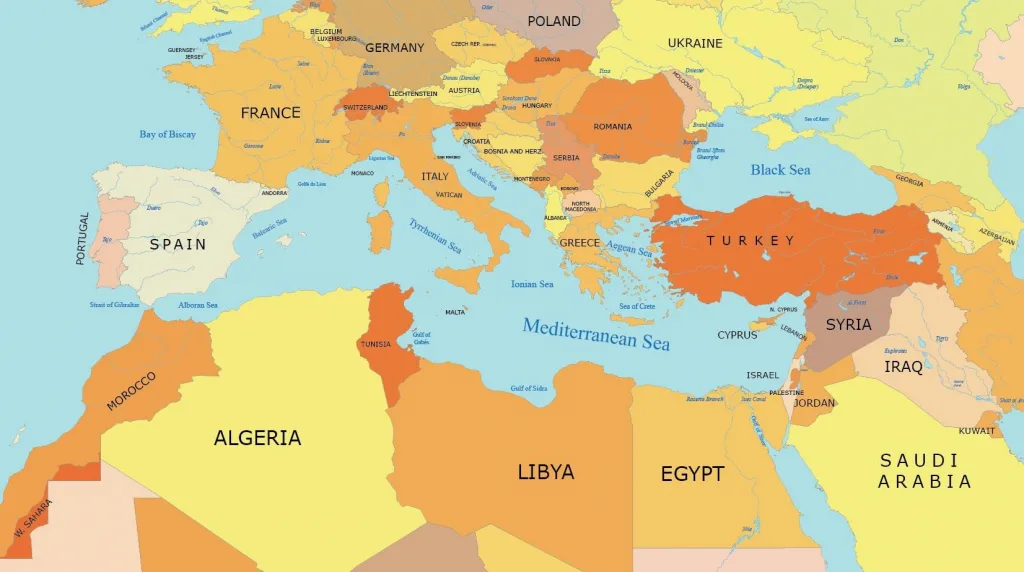Syllabus: GS2/International Relations
Context
- In a significant address at the 10th edition of the MED Mediterranean Dialogue in Rome, External Affairs Minister S. Jaishankar emphasised the mutual benefits of strengthening ties between India and the Mediterranean region.
About Mediterranean Region
- It encompasses Southern Europe (Spain, France, Monaco, Italy, Slovenia, Croatia, Bosnia and Herzegovina, Montenegro, Albania, Greece, Malta, and Cyprus); North Africa (Egypt, Libya, Tunisia, Algeria, and Morocco), and parts of West Asia (Turkey; Syria; Lebanon; Israel and Palestine).

- This vast area, historically a hub of global commerce, culture, and politics, has seen deepening interactions with India across various domains.
India-Mediterranean Relations
- Historical Ties and Cultural Exchange: Historical records indicate robust trade relations with the Roman Empire and the Greeks. The ancient port city of Muziris on India’s Malabar Coast was a bustling trading post where spices, exotic animals, and gold were exchanged.
- This historical connection laid the foundation for a rich cultural exchange that continues to influence bilateral relations.
- Strategic and Geopolitical Importance: The Mediterranean’s strategic location makes it a critical area for India’s geopolitical interests. The region serves as a bridge connecting Asia, Africa, and Europe, enhancing India’s connectivity across these continents.
- This connectivity is vital for India’s Indo-Pacific policy, which aims to ensure a free, open, and inclusive Indo-Pacific region.
- Political and Defense Cooperation: India’s political relations with Mediterranean countries are robust, with growing defense collaboration through more joint exercises and exchanges.
- The region’s strategic importance is underscored by India’s participation in the I2U2 grouping, which includes India, Israel, the UAE, and the US, focusing on economic and security cooperation.
- India and Italy are enhancing their defence ties through agreements and joint ventures which includes maritime domain awareness, information sharing, and defence production collaborations.
- Economic and Trade Relations: India’s trade with Mediterranean countries has grown substantially, reaching approximately USD 80 billion annually.
- Key sectors driving this trade include fertilizers, energy, water technology, diamonds, defense, and cyber capabilities.
- Indian companies are actively involved in significant infrastructure projects across the region, such as airports, ports, railways, and green hydrogen initiatives.
- Connectivity: A major development in India-Mediterranean relations is the India-Middle East-Europe Economic Corridor (IMEC), announced in 2023 with the aim to enhance connectivity and integration between India, the Middle East, and Europe, involving countries like the UAE, Saudi Arabia, Jordan, Israel, and the European Union.
- Cultural and Diaspora Links: The Mediterranean region is home to a significant Indian diaspora, with about 460,000 Indians residing there, 40% of whom are in Italy.
- This diaspora plays a crucial role in strengthening cultural ties and fostering mutual understanding between India and Mediterranean nations.
Key Concerns Related to India’s Influence in the Mediterranean Region
- Geopolitical Stability: The Mediterranean region is often characterised by political instability and conflicts, particularly in West Asia.
- The ongoing conflicts, such as the Israel-Palestine issue and tensions in Syria and Libya, pose significant challenges to India’s diplomatic efforts.
- The success of IMEC depends on overcoming regional conflicts and ensuring seamless cooperation among participating countries
- Energy Security: The Mediterranean region is crucial for India’s energy security, with significant imports of oil and gas from the Middle East and North Africa.
- Ensuring stable and secure energy supplies amidst regional volatility is a major concern.
- Additionally, India’s interests in renewable energy projects, such as green hydrogen initiatives, require robust partnerships and investments.
- Regional Conflicts and Security: The region faces persistent threats from piracy, illicit maritime activities, and conflicts in areas like Gaza and Lebanon. These issues require joint efforts to ensure freedom of navigation and regional security.
- India’s call for a ceasefire in West Asia and support for a two-state solution in the Israel-Palestine conflict reflect its commitment to regional peace and stability.
- Additionally, India’s engagement with both Israel and Iran highlights its balanced approach to regional diplomacy.
Conclusion and Way Forward
- India’s influence in the Mediterranean region is multifaceted, encompassing economic, strategic, and cultural dimensions.
- Addressing the key concerns of geopolitical stability, economic integration, energy security, diaspora welfare, infrastructure development, and regional conflicts is crucial for strengthening India’s role in this vital region.
- Through initiatives like the IMEC and proactive diplomacy, India can enhance its engagement and contribute to the stability and prosperity of the Mediterranean region.
Previous article
Role Women Members Played in the Constituent Assembly